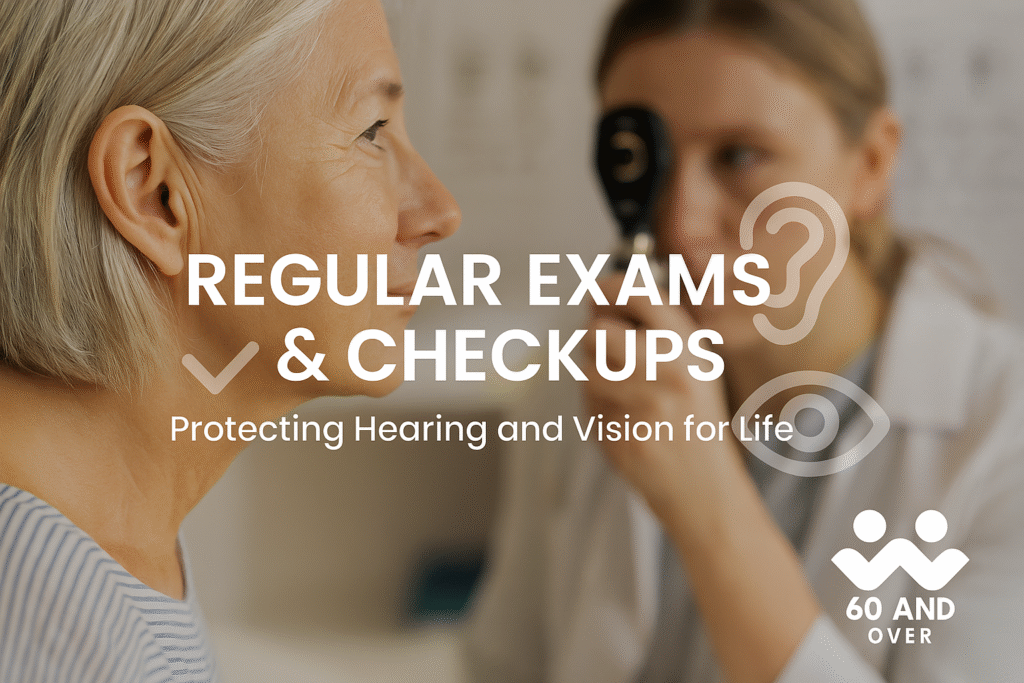Prevention Starts with Routine Care
Good hearing and clear vision are key to living independently and confidently. Yet, many older adults only visit a doctor when something goes wrong. Regular exams & checkups can catch small issues before they become big problems — from early hearing loss to signs of glaucoma or macular degeneration.
For seniors, these visits are more than medical appointments — they are an investment in safety, social connection, and long-term quality of life.
Why Regular Exams Matter for Seniors
As we grow older, changes in hearing and vision often happen slowly. The brain adapts, masking symptoms until function noticeably declines. By the time difficulties are obvious, damage may already be advanced or permanent.
Routine exams offer several benefits:
- Early detection of age-related conditions. Diseases like cataracts, glaucoma, and presbycusis (age-related hearing loss) can be treated more effectively when caught early.
- Prevention of accidents and falls. Poor vision and hearing make it harder to navigate safely or hear alarms and approaching cars.
- Maintaining independence. Seniors who see and hear well can manage their medications, finances, and social interactions more easily.
- Better communication with healthcare providers. Clear hearing and vision help seniors stay active participants in their own care.
Recommended Exam Schedule After 60
Every senior’s needs differ, but general medical guidelines suggest:
- Hearing Tests: Every 1–2 years for adults over 60. Sooner if there’s ringing in the ears, muffled speech, or difficulty following conversation.
- Eye Exams: Every 1–2 years, or annually for those with diabetes, hypertension, or a family history of eye disease.
- General Health Checkups: Once a year to monitor blood pressure, blood sugar, cholesterol, and medications that may affect hearing or vision.
Regular checkups help connect the dots between systems — for example, diabetes can harm the eyes and ears, while certain medications can reduce hearing sensitivity.
Hearing Exams: What to Expect
A hearing test is quick, painless, and often revealing. The process usually includes:
- Medical history review – The provider will ask about noise exposure, medications, and symptoms.
- Physical exam of the ears – To check for wax buildup, infection, or damage.
- Pure-tone testing – The patient listens to sounds of different pitches and volumes through headphones.
- Speech recognition test – Measures how well speech can be understood in quiet and noisy environments.
Afterward, the provider explains results using an audiogram — a chart that maps which sounds are hardest to hear.
If hearing loss is found, the next step may include:
- Referral to an audiologist or ENT specialist.
- Recommendation for hearing aids or assistive listening devices.
- Lifestyle and medication reviews to rule out reversible causes.
Vision Exams: What to Expect
Eye exams are equally important and just as simple. A typical appointment includes:
- Visual acuity test – Reading letters from a chart measures sharpness of sight.
- Refraction test – Determines if glasses or contact lenses are needed.
- Eye pressure test (tonometry) – Detects signs of glaucoma.
- Retinal and optic nerve exam – Using special lenses or imaging to identify macular degeneration or diabetic eye disease.
Some clinics also perform visual field tests to detect blind spots — critical for catching early glaucoma.
Common Hearing and Vision Conditions in Seniors
| Condition | What It Is | Why It Matters |
|---|---|---|
| Presbycusis | Gradual loss of high-pitched sounds due to aging. | Makes speech harder to follow, especially in noisy settings. |
| Tinnitus | Ringing or buzzing in the ears. | Often linked to hearing loss or medication side effects. |
| Cataracts | Clouding of the eye’s lens. | Blurs vision and increases fall risk; treatable with surgery. |
| Glaucoma | Increased eye pressure damaging the optic nerve. | Painless but can cause irreversible vision loss. |
| Macular Degeneration | Breakdown of the retina’s central area. | Affects sharp vision needed for reading and driving. |
| Diabetic Retinopathy | Damage to eye blood vessels from diabetes. | Can lead to blindness if unmanaged. |
Regular exams detect these conditions early — often before symptoms appear — allowing for simpler and more successful treatment.
How Caregivers Can Support Regular Checkups
Caregivers play a major role in ensuring seniors stay on top of routine appointments. Here’s how to help:
- Set reminders. Use calendars, apps, or family schedules for recurring visits.
- Keep a health folder. Store exam results, prescriptions, and doctor notes in one place.
- Coordinate transportation. Offer rides or arrange senior shuttle services.
- Ask questions at appointments. Caregivers can help clarify instructions and follow-up steps.
- Encourage consistency. Making checkups a regular habit builds trust with providers and prevents avoidable decline.
The Hidden Link Between Health Conditions and the Senses
Hearing and vision are deeply connected to overall health. Several chronic conditions can directly affect sensory function:
- Diabetes: Damages small blood vessels in the eyes and ears.
- High blood pressure: Reduces blood flow to delicate sensory organs.
- Thyroid or autoimmune diseases: Can cause inflammation in the ear or eye.
- Medication side effects: Some antibiotics, pain relievers, and heart medications can harm hearing or vision over time.
This is why holistic care — regular communication between primary doctors, eye specialists, and audiologists — is crucial for long-term wellness.
Signs It’s Time to Schedule a Visit
Seniors or caregivers should contact a provider promptly if any of the following occur:
Hearing Warning Signs:
- Frequently asking people to repeat themselves.
- Turning the TV volume higher than usual.
- Ringing or humming sounds in the ears.
- Avoiding social activities due to difficulty hearing.
Vision Warning Signs:
- Blurred or double vision.
- Difficulty seeing at night or in bright light.
- Straight lines appearing wavy or distorted.
- Frequent headaches or eye strain.
Prompt attention can often prevent permanent damage.
The Role of Preventive Screenings
Beyond exams, seniors benefit from related preventive screenings:
- Blood sugar tests – for diabetes-related eye and ear health.
- Cholesterol and blood pressure checks – to maintain circulation.
- Balance and fall-risk assessments – since poor hearing and vision often contribute to falls.
These screenings are commonly covered by Medicare or supplemental insurance, especially when part of an annual wellness visit.
Maintaining Healthy Habits Between Checkups
Even the best exams can’t replace daily care. Seniors can protect their senses with these habits:
- Eat foods rich in omega-3s, antioxidants, and vitamins A, C, and E.
- Wear UV-blocking sunglasses outdoors.
- Keep noise exposure low — use ear protection when mowing or vacuuming.
- Quit smoking — it restricts blood flow to the eyes and ears.
- Stay physically active to improve circulation and brain health.
When to Get a Second Opinion
If a senior is diagnosed with hearing or vision loss but treatment doesn’t seem effective, a second opinion can provide clarity. Sometimes, symptoms overlap — for example, medication side effects may mimic hearing loss, or cataract-related blur may resemble macular degeneration. Seeking another professional view ensures accurate diagnosis and appropriate treatment.
Conclusion: The Power of Prevention
A simple checkup can change everything. Regular hearing and vision exams don’t just preserve the senses — they preserve independence, confidence, and connection.
For seniors, these visits are not about “fixing” problems but maintaining a healthy, active life. For caregivers, helping loved ones stay consistent with checkups is one of the most valuable gifts of support.
Explore related Articles
Visit the links below to get even more information on hearing
- Assistive Listening Tech for Seniors
- Everyday Hearing Tips for Seniors
- Hearing Aids & Devices: What Seniors Should Know
Frequently Asked Questions
Q: How often should seniors get hearing and vision exams?
A: Most experts recommend every 1–2 years after age 60, or annually for those with diabetes, high blood pressure, or a family history of eye or ear disease.
Q: Why are regular checkups so important for older adults?
A: Age-related changes in hearing and vision often happen slowly. Routine exams catch issues early, when treatment is simpler and more effective.
Q: What can caregivers do to help seniors stay on schedule?
A: Caregivers can set reminders, arrange transportation, keep medical records organized, and attend appointments to help seniors understand instructions.
Q: Are hearing and vision problems connected to other health conditions?
A: Yes. Conditions like diabetes, hypertension, and medication side effects can impact both hearing and eyesight, which makes regular monitoring essential.
Q: What happens if seniors skip their exams?
A: Missed appointments can delay diagnosis of treatable problems, leading to avoidable vision loss, unsafe falls, or worsening hearing decline.





